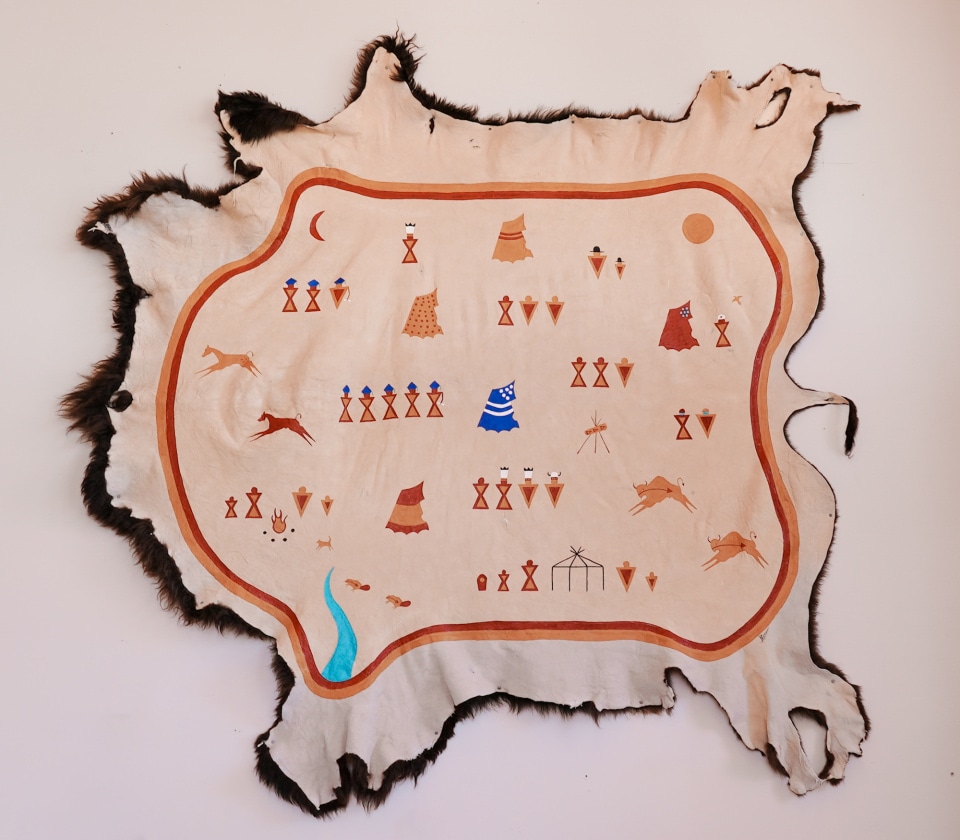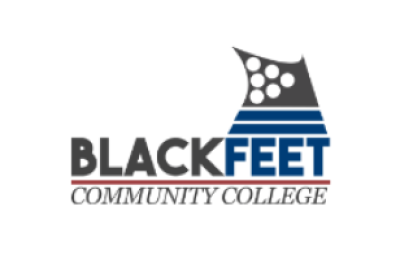Vision Statement
It is the vision ofBlackfeet Community College to strengthen and enrich our Blackfeet Nation and universal community through quality education integrating the Nii-tsi-ta-pi World of Knowledge.
In Recognition of the fact that we all have values that are shaped and developed through our interactions with others and that these values shape our thoughts and actions, the students, staff, administration, and Board of Trustees of Blackfeet Community College adopt the following core values:
Our Core Values
- Tsi-Ksi-Ka-Ta-Pi-Wa-Tsin - Blackfeet Way of Knowing: Blackfeet Culture/Spirituality in philosophy, thought, and action.
- Nin-na-wa-tsin - Being a Leader: Professionalism, integrity, and responsibility in human interaction.
- Ini-yimm - Respect: Respect for oneself, all other people, all ideas, and each thing in the natural world.
- Ni-ta-pi-pa-ta-pi-tsin - Living in a Good Way: Honest in all thoughts and actions.
- Ii-yi-kah-kii-ma-tsin - Trying Hard: Commitment, dedication, sincerity in the pursuit of all our goals.
- Aoh-kan-otah-tomo - Accepting Everyone: Embracing the unique talents and contributions of each individual
- Ii-ta-mii-pa-ta-yoip - Happy Living: Humor, laughter, and enjoyment of life.
WE ARE COMMITTED to ensuring that all of these values are incorporate into all that we do, fufilling the vision and mission of the Blackfeet Community College.
Mission Statement
The purpose of Blackfeet Community College is to provide the Blackfeet Nation and our "Universal Community" access to quality educational programs that prepare students for achievement in higher education, meaningful employment, basic skills instruction, and continuing education while integrating the Blackfeet Culture and language.
Mission Statement Core Themes
1. Access – providing access to all community service district members who desire education and training, enabling them to pursue life-long opportunities.
2. Achievement in Higher Education – providing an opportunity for students to earn academic degrees and supporting their transfer to upper-division higher education institutions.
3. Meaningful Employment – provides students an opportunity to earn degrees and certificates that would qualify them to gain meaningful employment.
4. Basic skills – providing students with programs and courses that will increase their likelihood of academic success.
5. Continuing Education – providing the community with courses and programs that enrich community life and support lifelong education
6. Integrating Blackfeet Culture and Language – providing programs and courses that sustain the past and promote the vitality of the Blackfeet Nation's future.
Our History
In 1972, the Blackfeet Tribal Business Council established a 10-year comprehensive plan...
In 1972, the Blackfeet Tribal Business Council established a 10-year comprehensive plan for the Blackfeet Nation. B.C.C. identified needs and goals through needs assessments and studies required for implementing federal programs. The plan identified the need for a community college, workforce/technical school, new facilities, and educational programs.
In October of 1974…
In October 1974, the Blackfeet Tribal Business Council chartered the Blackfeet Community College by Executive Action to "…provide post-secondary and higher educational services…" to the residents of the Blackfeet Nation and surrounding communities. The impetus for this action grew from early tribal efforts to provide an educational opportunity to its residents in a physically, climatically, and culturally isolated area.
The Blackfeet Tribe, in its relationship with the federal government as a sovereign nation, is recognized as a nation within a nation through treaties, laws, and executive orders. In the late 1960s, federal programs and laws resulted from tribal efforts to promote their people's health, education, and welfare.
The Indian Education Act of 1972 and the Office of Economic Opportunity programs of the 1964 Act provided new resources for tribes to provide adult education. The Blackfeet Tribe took advantage of these programs in its quest to develop itself economically and promote self-sufficiency with the idea that the development of human resources is integral to improving the Blackfeet Tribe. A Timeline of the Tribal College Movement and AIHEC
In 1976, the Blackfeet Board of Tribal Educators...
In 1976, the Blackfeet Board of Tribal Educators, under the auspices of the Blackfeet Tribal Business Council, agreed with Flathead Valley Community College of Kalispell, Montana, to offer extension courses on the reservation. Flathead Valley Community College, via a Title III Strengthening Institutions Grant, then established an extension center on the Blackfeet Reservation. Subsequently, coordinators were hired to supervise and implement programs and courses. Students at Blackfeet Community College earned credits from Flathead Valley Community College since Blackfeet Community College was not an independent accredited entity.
The Tribally Controlled Colleges and Universities Assistance Act of 1978, as amended (TCCUA), authorizes Federal assistance to institutions of higher education that are formally controlled or have been formally sanctioned or chartered by the governing body of an Indian tribe or tribes.
In early 1979, the Blackfeet Board of Regents took action to become an independent institution...
The NWCCU Commission on Colleges granted candidacy status in December 1979. In early 1979, the Blackfeet Board of Regents took action to become an independent institution. The College sought candidacy status for accreditation from the Northwest Association of Schools and Colleges (NWCCU). In 1980, Blackfeet Community College ended its satellite status relationship with Flathead Valley Community College. This new status enabled Blackfeet Community College to more closely tailor its offerings to the needs and interests of local students.
On December 11, 1985, Blackfeet Community College received accreditation...
On December 11, 1985, Blackfeet Community College received accreditation. After an extensive self-study review process, NWCCU reaffirmed the College's accreditation in 2000. More recently, the College was reviewed by NWCCU in 2010 for accreditation and was granted it with several findings, which the College addressed to ensure continued accreditation by NWCCU.
In 1994, Blackfeet Community College became a 1994 Land Grant Institution...
In 1994, Blackfeet Community College became a 1994 Land Grant Institution established for the benefit of agriculture and the mechanical arts in accordance with the provisions of the Act of July 2, 1862 (12 Stat.503:7 U.S.C. 301 et seq.), commonly known as the First Morrill Act. The Morrill Land-Grant Acts are United States statutes that allowed for creating land-grant colleges in U.S. states using the proceeds from sales of federally owned land, often obtained from Native American tribes through treaty, cession, or seizure.
However, the Equity in Educational Land-Grant Status Act of 1994 provides land-grant status for certain Indian colleges and institutions (1994 Institutions) and authorizes appropriations to establish an endowment for such Institutions instead of their extension. The 1994 Land Grant Institutions have missions to serve their consumers through higher education programs involving teaching, community outreach, and research. The 1994 Land Grant Institutions primarily serve Native American populations typically located in remote, underserved communities that lack access to higher education.
50th Anniversary Story Robe

REACHING FOR THE STARS: The Story Robe of Blackfeet Community College Celebrating 50 Years of Resilience, Culture, and Education
The Reaching for the Stars Story Robe honors the history of Blackfeet Community College. The artwork, created by John Isaiah Pepion, illustrates key milestones and achievements of BFCC over the years. The stories depicted were recorded with input from the founders, past administration, and alumni, capturing the spirit, resilience, and cultural legacy of the college.
This story robe is on display in the Beaver Painted Lodge administration foyer.

